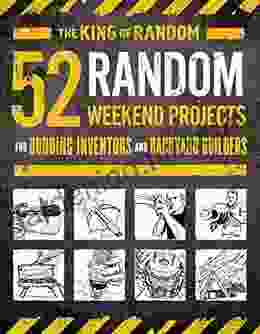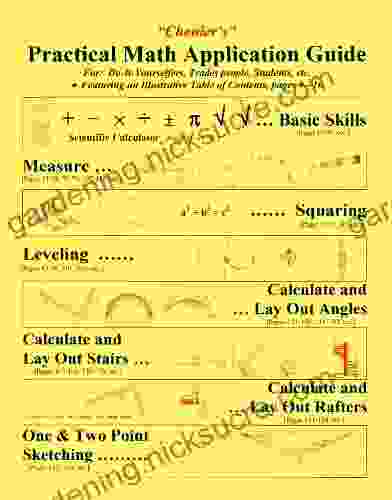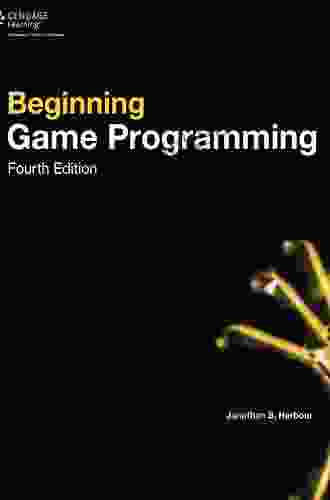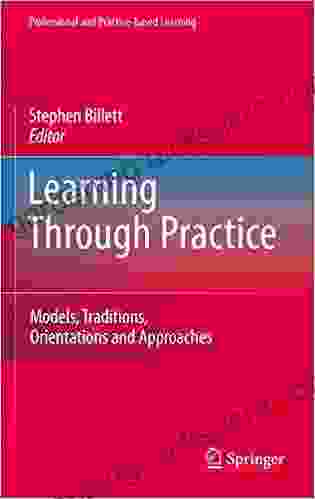A Comprehensive Guide to Beginning Game Programming: Embark on Your Journey to Create Immersive Virtual Worlds

In the realm of entertainment and technology, game programming stands as a captivating and rewarding field. It empowers individuals to bring their imagination to life by creating immersive virtual worlds that captivate players. Whether you're an aspiring game developer or simply curious about the intricacies of game creation, this comprehensive guide will provide you with the essential knowledge and tools to embark on this exciting journey.
4.5 out of 5
| Language | : | English |
| File size | : | 27396 KB |
| Text-to-Speech | : | Enabled |
| Screen Reader | : | Supported |
| Enhanced typesetting | : | Enabled |
| Print length | : | 748 pages |
Understanding Game Development
Game development encompasses a multifaceted process that involves designing, developing, and implementing interactive digital experiences. At its core, it revolves around creating virtual worlds that respond to player input, provide engaging challenges, and evoke compelling emotions.
The development process typically follows a linear workflow, commencing with conceptualization, where the game's core ideas and gameplay mechanics are defined. This is followed by pre-production, which involves detailed planning, asset creation, and prototyping. Full-scale production ensues, encompassing the implementation of game code, art, audio, and other elements. Finally, post-production involves testing, debugging, and polishing the game before its release.
Essential Skills for Game Programmers
Aspiring game programmers require a diverse skillset that encompasses both technical proficiency and creative thinking. Core technical skills include:
- Programming Languages: Proficiency in programming languages such as C++, C#, and Java is essential for implementing game logic, physics, and other core mechanics.
- Game Engines: Game engines like Unity and Unreal Engine provide a framework for developing games, offering tools for physics simulation, rendering, and more.
- Data Structures and Algorithms: Understanding data structures and algorithms is crucial for organizing and manipulating game data efficiently.
- Game Design: Familiarity with game design principles, including level design, character development, and gameplay mechanics, is essential for creating engaging experiences.
In addition to technical skills, game programmers should possess:
- Creativity and Imagination: Game programming requires the ability to envision and bring to life compelling virtual worlds and characters.
- Problem-Solving Abilities: Game development involves solving complex technical and design challenges.
- Teamwork and Communication: Game development is often a collaborative effort, requiring effective communication and teamwork skills.
Choosing a Programming Language
Selecting the right programming language for game development depends on your specific needs and preferences. Here's a brief overview of some popular choices:
- C++: A powerful and versatile language widely used in game development for its speed and low-level control.
- C#: A modern, object-oriented language that is popular for its ease of use and extensive library support, making it suitable for both beginners and experienced programmers.
- Java: A robust, cross-platform language that is commonly used for developing mobile and web games.
- Python: An easy-to-learn, interpreted language that is gaining popularity in game development due to its simplicity and flexibility.
Getting Started with Game Engines
Game engines provide a powerful foundation for game development, offering a comprehensive set of tools and frameworks to streamline the development process. Popular game engines include:
- Unity: A versatile, cross-platform game engine that is popular for its ease of use and extensive asset library.
- Unreal Engine: A high-performance game engine known for its advanced graphics capabilities and extensive toolset.
- Godot: An open-source, cross-platform game engine that offers a user-friendly interface and a wide range of features.
Choosing a game engine depends on your specific requirements and experience level. Unity is a great choice for beginners, while Unreal Engine is more suitable for experienced developers requiring high-end graphics and performance.
Creating Your First Game
Creating your first game is an exciting and rewarding experience. Here's a step-by-step guide to help you get started:
- Conceptualize Your Game: Start by defining the core ideas and gameplay mechanics of your game. Consider the genre, target audience, and overall theme.
- Design Game Mechanics: Determine how the game will function, including player controls, object interactions, and scoring systems.
- Create Game Art: Develop the visual assets for your game, including character sprites, backgrounds, and UI elements. Consider using free or paid asset libraries to save time.
- Implement Game Code: Using the programming language and game engine of your choice, implement the game mechanics, physics, and other core functionality.
- Test and Debug: Regularly test your game to identify and fix any bugs or glitches. Seek feedback from others to improve the gameplay experience.
- Polish and Release: Once your game is fully functional and polished, prepare it for release on your chosen platform (e.g., mobile, PC, console).
Beginning game programming is an exciting journey that requires dedication, creativity, and a passion for creating immersive virtual experiences. By understanding the essentials of game development, mastering the necessary skills, and utilizing the right tools, aspiring game programmers can unlock their potential and embark on a rewarding career in this captivating field.
4.5 out of 5
| Language | : | English |
| File size | : | 27396 KB |
| Text-to-Speech | : | Enabled |
| Screen Reader | : | Supported |
| Enhanced typesetting | : | Enabled |
| Print length | : | 748 pages |
Do you want to contribute by writing guest posts on this blog?
Please contact us and send us a resume of previous articles that you have written.
 Fiction
Fiction Non Fiction
Non Fiction Romance
Romance Mystery
Mystery Thriller
Thriller SciFi
SciFi Fantasy
Fantasy Horror
Horror Biography
Biography Selfhelp
Selfhelp Business
Business History
History Classics
Classics Poetry
Poetry Childrens
Childrens Young Adult
Young Adult Educational
Educational Cooking
Cooking Travel
Travel Lifestyle
Lifestyle Spirituality
Spirituality Health
Health Fitness
Fitness Technology
Technology Science
Science Arts
Arts Crafts
Crafts DIY
DIY Gardening
Gardening Petcare
Petcare Lewis Henry Morgan
Lewis Henry Morgan Karl Morris
Karl Morris Billie Jean King
Billie Jean King 4th Edition Kindle Edition
4th Edition Kindle Edition Jordan Ifueko
Jordan Ifueko Brian Thompson
Brian Thompson Tok Hui Yeap Rd Csp Ld
Tok Hui Yeap Rd Csp Ld E Bruce Goldstein
E Bruce Goldstein Gail Craswell
Gail Craswell Robert Bauval
Robert Bauval 4th Edition Kindle Edition With Audio Video
4th Edition Kindle Edition With Audio Video James D Long
James D Long Mike Tyson
Mike Tyson Bree Moore
Bree Moore Roselyn Teukolsky
Roselyn Teukolsky David Beaupre
David Beaupre Dr Katayune Kaeni
Dr Katayune Kaeni Jacquetta Hawkes
Jacquetta Hawkes John A Yoegel
John A Yoegel Heather Job
Heather Job Justine Brooks Froelker
Justine Brooks Froelker Filipe Masetti Leite
Filipe Masetti Leite Micah Goodman
Micah Goodman L Ulloque
L Ulloque Bobby Blair
Bobby Blair Ricki E Kantrowitz
Ricki E Kantrowitz L Madison
L Madison Robert Thurston
Robert Thurston Kenny Casanova
Kenny Casanova Tony Horton
Tony Horton Subsequent Edition Kindle Edition
Subsequent Edition Kindle Edition Kyla Stone
Kyla Stone Jenifer Fox
Jenifer Fox Maureen Johnson
Maureen Johnson Jeffrey A Greene
Jeffrey A Greene Jack M Bloom
Jack M Bloom Raymond Buckland
Raymond Buckland Christoph Delp
Christoph Delp Nnedi Okorafor
Nnedi Okorafor Tami Lynn Kent
Tami Lynn Kent 1st Ed 2016 Edition Kindle Edition
1st Ed 2016 Edition Kindle Edition Nathan Jendrick
Nathan Jendrick Kristi K Hoffman
Kristi K Hoffman Eric I Karchmer
Eric I Karchmer Lin Pardey
Lin Pardey Edward Frenkel
Edward Frenkel Alessa Ellefson
Alessa Ellefson Naomi Scott
Naomi Scott Don Fink
Don Fink Eva Feder Kittay
Eva Feder Kittay Justin Doyle
Justin Doyle Debra Pascali Bonaro
Debra Pascali Bonaro Emma Lord
Emma Lord Meik Wiking
Meik Wiking James Mcnicholas
James Mcnicholas Patricia S Potter Efron
Patricia S Potter Efron Naomi Feil
Naomi Feil Charles Seife
Charles Seife Max Domi
Max Domi Deepak Chopra
Deepak Chopra Kelly Skeen
Kelly Skeen Allan Mundsack
Allan Mundsack Chris I Naylor
Chris I Naylor Robert A Johnson
Robert A Johnson David Kushner
David Kushner Jason Miller
Jason Miller G I Gurdjieff
G I Gurdjieff 3rd Edition Kindle Edition
3rd Edition Kindle Edition Theris A Touhy
Theris A Touhy Patrick Lange
Patrick Lange Cindy Kennedy
Cindy Kennedy Dan Blackburn
Dan Blackburn Diamond Wilson
Diamond Wilson Bryan Smith
Bryan Smith Jamie Hand
Jamie Hand Andrew Maraniss
Andrew Maraniss Z Justin Ren
Z Justin Ren Collins Gcse
Collins Gcse Michael Clarke
Michael Clarke Jeff Gill
Jeff Gill Bruce Watson
Bruce Watson Terrence Real
Terrence Real Debra Barnes
Debra Barnes Vibrant Publishers
Vibrant Publishers 50minutes Com
50minutes Com Dr Brenda Stratton
Dr Brenda Stratton Aly Madhavji
Aly Madhavji Shonna Slayton
Shonna Slayton Simon G Thompson
Simon G Thompson Carl J Sindermann
Carl J Sindermann Jong Chul Ye
Jong Chul Ye John Hands
John Hands 2012th Edition Kindle Edition
2012th Edition Kindle Edition Janet Sasson Edgette
Janet Sasson Edgette Theodore X O Connell
Theodore X O Connell Aubrey Clayton
Aubrey Clayton Starley Talbott
Starley Talbott 2005th Edition Kindle Edition
2005th Edition Kindle Edition Ziemowit Wojciechowski
Ziemowit Wojciechowski Bonnie Scott
Bonnie Scott Theresa Cheung
Theresa Cheung Muata Ashby
Muata Ashby Jozef Nauta
Jozef Nauta Steve Kantner
Steve Kantner Andrew Shapland
Andrew Shapland Lj Rivers
Lj Rivers Robert Pondiscio
Robert Pondiscio Melissa Cheyney
Melissa Cheyney Leonard Pellman
Leonard Pellman Eric Dominy
Eric Dominy Andrew Collins
Andrew Collins Iris Bohnet
Iris Bohnet Tony Hernandez Pumarejo
Tony Hernandez Pumarejo Alice Ginott
Alice Ginott Gary S Thorpe
Gary S Thorpe Louis Liebenberg
Louis Liebenberg Jon Dunn
Jon Dunn Stefan Hofer
Stefan Hofer Eloise Jarvis Mcgraw
Eloise Jarvis Mcgraw Olszewski Marie Erin
Olszewski Marie Erin Evan Brashier
Evan Brashier Joe Cuhaj
Joe Cuhaj Sarah Templeton
Sarah Templeton Freda Mcmanus
Freda Mcmanus Alec Crawford
Alec Crawford Terence Grieder
Terence Grieder 5th Edition Kindle Edition
5th Edition Kindle Edition John Gookin
John Gookin Sheryl Crow
Sheryl Crow Peter Dewhurst
Peter Dewhurst Manhattan Prep
Manhattan Prep Claire Sierra
Claire Sierra 6th Edition Kindle Edition
6th Edition Kindle Edition A C Davison
A C Davison Elizabeth Sims
Elizabeth Sims Kristine Setting Clark
Kristine Setting Clark Michael Geheran
Michael Geheran David Simkins
David Simkins Grant Thompson
Grant Thompson Ulla Sarmiento
Ulla Sarmiento Kristen Riecke
Kristen Riecke Harry Middleton
Harry Middleton A Digger Stolz
A Digger Stolz Chris Stewart
Chris Stewart Emma Dalton
Emma Dalton Apsley Cherry Garrard
Apsley Cherry Garrard Mark Hatmaker
Mark Hatmaker Alden Jones
Alden Jones Sam Irwin
Sam Irwin Oliver Theobald
Oliver Theobald Frank Sargeant
Frank Sargeant Richard Bromfield
Richard Bromfield Dr Danny Penman
Dr Danny Penman Tim R Wolf
Tim R Wolf Lesli Richards
Lesli Richards Marcia Verduin
Marcia Verduin J Michael Leger
J Michael Leger Jacqueeia Ferguson
Jacqueeia Ferguson Richard Adams
Richard Adams Nathalie Dupree
Nathalie Dupree Jo Frost
Jo Frost Yan Shen
Yan Shen Dave Gerr
Dave Gerr Patricia Stevens
Patricia Stevens Nadav Snir
Nadav Snir Peter Cossins
Peter Cossins Laurie Forest
Laurie Forest Hong Chen
Hong Chen Prerna Lal
Prerna Lal Steve Magness
Steve Magness Paul Deepan
Paul Deepan Katie M John
Katie M John Michaela Stith
Michaela Stith Gayle Jervis
Gayle Jervis Louis Stanislaw
Louis Stanislaw Cassandra Johnson
Cassandra Johnson Joe Chilson
Joe Chilson Lois Duncan
Lois Duncan Marisha Pessl
Marisha Pessl George W E Nickelsburg
George W E Nickelsburg Ernest Shackleton
Ernest Shackleton Dustyn Roberts
Dustyn Roberts Thomas Wentworth Higginson
Thomas Wentworth Higginson Pamela Adams
Pamela Adams Bob Welch
Bob Welch Mary H K Choi
Mary H K Choi Jason Curtis
Jason Curtis Ben Egginton
Ben Egginton Gianni La Forza
Gianni La Forza Barnett Rich
Barnett Rich Bertolt Brecht
Bertolt Brecht Keith Siragusa
Keith Siragusa Sadie Radinsky
Sadie Radinsky Jay Wilkinson
Jay Wilkinson Erika Bornman
Erika Bornman Gregory Collins
Gregory Collins Jiichi Watanabe
Jiichi Watanabe Chris Lehto
Chris Lehto Bill Reif
Bill Reif Edward Rosenfeld
Edward Rosenfeld Syougo Kinugasa
Syougo Kinugasa Patrick E Mcgovern
Patrick E Mcgovern Cynthia Bourgeault
Cynthia Bourgeault Caroline Porter Thomas
Caroline Porter Thomas Christa Orecchio
Christa Orecchio Barbara Klein
Barbara Klein Broccoli Lion
Broccoli Lion Terence N D Altroy
Terence N D Altroy Heather Demetrios
Heather Demetrios Dalai Lama
Dalai Lama Donna M Mertens
Donna M Mertens Linda A Roussel
Linda A Roussel Daphne Adler
Daphne Adler Elizabeth Wenk
Elizabeth Wenk Karen Myers
Karen Myers James Diego Vigil
James Diego Vigil Adam Silvera
Adam Silvera Rick Gurnsey
Rick Gurnsey Steve Garnett
Steve Garnett Tracy Gharbo
Tracy Gharbo Patrick Hunt
Patrick Hunt Laura Bright
Laura Bright Mitch Rubman
Mitch Rubman Suzie Cooney
Suzie Cooney William A Dembski
William A Dembski Sandra Mizumoto Posey
Sandra Mizumoto Posey David Cheng
David Cheng Andrea Wulf
Andrea Wulf Justin Hammond
Justin Hammond Diane Duane
Diane Duane Samantha Lovely
Samantha Lovely Russell Miller
Russell Miller Katie J Trent
Katie J Trent Tom Mchale
Tom Mchale 1st English Ed Edition Kindle Edition
1st English Ed Edition Kindle Edition Michael W Ford
Michael W Ford Monica Sorrenson
Monica Sorrenson Duy Tran
Duy Tran Rashad Jennings
Rashad Jennings Stephen P Anderson
Stephen P Anderson Michael S Gazzaniga
Michael S Gazzaniga Martha Menchaca
Martha Menchaca Margaret Littman
Margaret Littman Betty Crocker
Betty Crocker George Pendle
George Pendle Josh Mulvihill
Josh Mulvihill John Collins
John Collins Claire Baker
Claire Baker Robert Peter Gale
Robert Peter Gale Eric Haseltine
Eric Haseltine Jasper Godwin Ridley
Jasper Godwin Ridley Andrew G Marshall
Andrew G Marshall Michael Romano
Michael Romano Rowan Ricardo Phillips
Rowan Ricardo Phillips Clint Malarchuk
Clint Malarchuk Jillian Dodd
Jillian Dodd Kelly Slater
Kelly Slater John Green
John Green Breanna Lam
Breanna Lam Miranda Castro
Miranda Castro Jd Brown
Jd Brown Emily A Duncan
Emily A Duncan Glenn N Levine
Glenn N Levine Kate Spencer
Kate Spencer Raymond H Thompson
Raymond H Thompson J D Salinger
J D Salinger Amy Chua
Amy Chua Rifujin Na Magonote
Rifujin Na Magonote Lee Smolin
Lee Smolin Al Ford
Al Ford Steven D Levitt
Steven D Levitt Bruno Latour
Bruno Latour Richard Ania
Richard Ania 1st Edition Kindle Edition
1st Edition Kindle Edition Wong Kiew Kit
Wong Kiew Kit Porter Fox
Porter Fox Paul Johnson
Paul Johnson Alan Jacobs
Alan Jacobs Kate Usher
Kate Usher Shelby Hailstone Law
Shelby Hailstone Law Elizabeth D Hutchison
Elizabeth D Hutchison Mark V Wiley
Mark V Wiley Andrew Weber
Andrew Weber Jeremy Desilva
Jeremy Desilva Juno Dawson
Juno Dawson Natasha Preston
Natasha Preston Gregory J Privitera
Gregory J Privitera Lareina Rule
Lareina Rule Marty Bartholomew
Marty Bartholomew 3rd Ed Edition Kindle Edition
3rd Ed Edition Kindle Edition Thomas R Baechle
Thomas R Baechle Liesbet Collaert
Liesbet Collaert John Gribbin
John Gribbin Kekla Magoon
Kekla Magoon Riddleland
Riddleland Gina Rae La Cerva
Gina Rae La Cerva Skye Genaro
Skye Genaro Tasha Dunn
Tasha Dunn John Iceland
John Iceland Mimi Lemay
Mimi Lemay Anthony Arvanitakis
Anthony Arvanitakis Patrick Viafore
Patrick Viafore Manuel De La Cruz
Manuel De La Cruz Chris Dietzel
Chris Dietzel Leslie Leyland Fields
Leslie Leyland Fields Whit Honea
Whit Honea Claudio De Castro
Claudio De Castro Gershon Ben Keren
Gershon Ben Keren Robert Ferguson
Robert Ferguson Andy Charalambous
Andy Charalambous Carol Stock Kranowitz
Carol Stock Kranowitz Theodor W Adorno
Theodor W Adorno Robert S Mueller
Robert S Mueller 8th Edition Kindle Edition
8th Edition Kindle Edition Nancy Keene
Nancy Keene Nikki Grimes
Nikki Grimes William Regal
William Regal Dominik Hartmann
Dominik Hartmann John Kreiter
John Kreiter Howard Mudd
Howard Mudd Jessica Shortall
Jessica Shortall Icon Digital Publishing
Icon Digital Publishing Elaine Beaumont
Elaine Beaumont Geri Ann Galanti
Geri Ann Galanti Patricia O Quinn
Patricia O Quinn Deanne Howell
Deanne Howell Jamaica Stevens
Jamaica Stevens Kerri Maniscalco
Kerri Maniscalco Stewart Smith
Stewart Smith Pat Dorsey
Pat Dorsey Robert Venditti
Robert Venditti Michael Alvear
Michael Alvear A Christine Harris
A Christine Harris Patricia Moore Pastides
Patricia Moore Pastides Andre Norton
Andre Norton Bernard Cornwell
Bernard Cornwell Mark Gregston
Mark Gregston Susan Walker
Susan Walker Roger Gordon
Roger Gordon Neal Bascomb
Neal Bascomb Kerry Fraser
Kerry Fraser Marie Louise Von Franz
Marie Louise Von Franz 006 Edition Kindle Edition
006 Edition Kindle Edition Leigh Calvez
Leigh Calvez Joe Oliver
Joe Oliver Oscar Wegner
Oscar Wegner Peter Wohlleben
Peter Wohlleben Seymour Simon
Seymour Simon Dan Falk
Dan Falk Dan Wingreen
Dan Wingreen Sloane Mcclain
Sloane Mcclain Chris Froome
Chris Froome Brooklyn James
Brooklyn James 7th Edition Kindle Edition
7th Edition Kindle Edition Brenda Dehaan
Brenda Dehaan Heather Rain Mazen Korbmacher
Heather Rain Mazen Korbmacher Greg Midland
Greg Midland Bernard Rosner
Bernard Rosner Garrett Grolemund
Garrett Grolemund Sherry Monahan
Sherry Monahan 2nd Edition Kindle Edition
2nd Edition Kindle Edition Mei Fong
Mei Fong Temple Grandin
Temple Grandin Ellen Levitt
Ellen Levitt Jean Clottes
Jean Clottes Edyta Roszko
Edyta Roszko Mohamed Elgendy
Mohamed Elgendy L S Boos
L S Boos Dinokids Press
Dinokids Press Jay Cassell
Jay Cassell Joseph E Garland
Joseph E Garland Justin Bower
Justin Bower Nick Winkelman
Nick Winkelman Buddy Martin
Buddy Martin Geoffrey West
Geoffrey West Mark Brazil
Mark Brazil Kennedy Achille
Kennedy Achille Ellen Sue Turner
Ellen Sue Turner Eli Boschetto
Eli Boschetto Chase Williams
Chase Williams David Lloyd Kilmer
David Lloyd Kilmer Lars Behnke
Lars Behnke Paul Martin
Paul Martin Martin Mobraten
Martin Mobraten Leon Anderson
Leon Anderson Elizabeth Bradfield
Elizabeth Bradfield Tyler Vanderweele
Tyler Vanderweele Susan E Cayleff
Susan E Cayleff Jasmine Greene
Jasmine Greene Joseph Chilton Pearce
Joseph Chilton Pearce Janetti Marotta
Janetti Marotta Sam Goulden
Sam Goulden A C Grayling
A C Grayling Dervla Murphy
Dervla Murphy Monte Burch
Monte Burch Tom Lyons
Tom Lyons P G Maxwell Stuart
P G Maxwell Stuart Brennan Barnard
Brennan Barnard Bookrags Com
Bookrags Com A R Bernard
A R Bernard Greta Solomon
Greta Solomon Nate G Hilger
Nate G Hilger Christy Jordan
Christy Jordan Tom Pyszczynski
Tom Pyszczynski Miko Flohr
Miko Flohr Christopher Mcdougall
Christopher Mcdougall Lucas Whitecotton
Lucas Whitecotton Brian Kent
Brian Kent Jonathan Ross
Jonathan Ross Robert K Tyson
Robert K Tyson Leonardo Trasande
Leonardo Trasande J Morgan Mcgrady
J Morgan Mcgrady Mauricio Cabrini
Mauricio Cabrini Christopher Lakeman
Christopher Lakeman Herbert Feigl
Herbert Feigl Gregory A Boyd
Gregory A Boyd Fata Ariu Levi
Fata Ariu Levi Kevin Paul
Kevin Paul Lenora Ucko
Lenora Ucko Robert Mcentarffer
Robert Mcentarffer Josh Elster
Josh Elster Natalie Smith
Natalie Smith John Coleman
John Coleman Jim Burns
Jim Burns 50minutos Es
50minutos Es Amy Ogle
Amy Ogle
Light bulbAdvertise smarter! Our strategic ad space ensures maximum exposure. Reserve your spot today!

 Sammy PowellDiscover The Ultimate You For Life: A Comprehensive Guide to Unlocking Your...
Sammy PowellDiscover The Ultimate You For Life: A Comprehensive Guide to Unlocking Your... Gavin MitchellFollow ·12.7k
Gavin MitchellFollow ·12.7k David BaldacciFollow ·15.4k
David BaldacciFollow ·15.4k Howard PowellFollow ·6.4k
Howard PowellFollow ·6.4k Derrick HughesFollow ·15.7k
Derrick HughesFollow ·15.7k Douglas AdamsFollow ·15k
Douglas AdamsFollow ·15k Diego BlairFollow ·14.4k
Diego BlairFollow ·14.4k Raymond ChandlerFollow ·14.2k
Raymond ChandlerFollow ·14.2k Chadwick PowellFollow ·8.8k
Chadwick PowellFollow ·8.8k

 Finn Cox
Finn CoxA Comprehensive Guide for Budding Inventors and Backyard...
For those with a restless mind and a...

 Forrest Reed
Forrest ReedThe Ultimate Shopper's Guide to Purchasing Weight Lifting...
Are you looking...

 Dillon Hayes
Dillon HayesThe Chemical Choir: Unveiling the Enchanting Symphony of...
In the enigmatic realm of science, where...

 Ryūnosuke Akutagawa
Ryūnosuke AkutagawaStumbling Thru: Hike Your Own Hike
In the realm of outdoor adventures,...

 Terry Pratchett
Terry PratchettUnlock Your Math Skills: A Comprehensive Guide to Chenier...
Math plays a vital role in...
4.5 out of 5
| Language | : | English |
| File size | : | 27396 KB |
| Text-to-Speech | : | Enabled |
| Screen Reader | : | Supported |
| Enhanced typesetting | : | Enabled |
| Print length | : | 748 pages |












